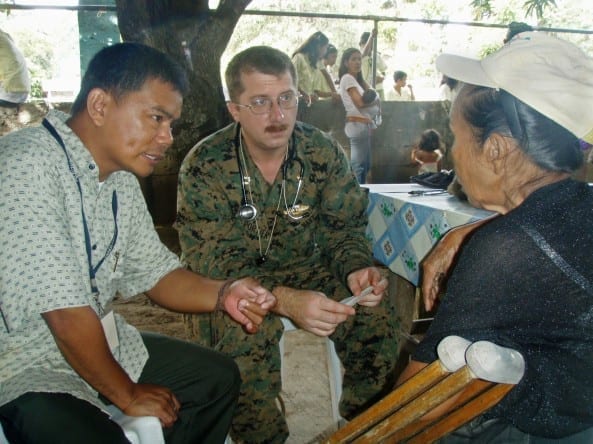There are aspects of the mission of the U.S. Marine Corps that are not only critical and life-saving. They are nothing short of magical.

Most people understand the wartime mission of the U.S. military. The Marines are known as the “First to Fight” since they are by nature expeditionary and much of their work is contingency-based. Several other aspects of the Marine Corps’ mission, though, foster international cooperation, support diplomacy and “wage peace.” U.S. Navy doctors and hospital corpsmen take care of the Marine Corps’ medical needs. These doctors and corpsmen working with their foreign counterparts often solve health problems in areas of severe need. That’s the magic.
The Marine Corps’ Medical Civil Action Programs, or MEDCAPs, are an example of medical diplomacy in noncombatant situations. In developing countries – such as Thailand, Cambodia and the Republic of the Philippines – access to medical care is sometimes limited. Access to highquality pharmaceuticals and dental care is often nonexistent. Partnering with host-nation military physicians, groups of doctors go from city to city providing free medical and dental care, allowing residents to travel to those sites. This is very popular with the people. And since U.S. and hostnation doctors are working and training together, the MEDCAPs usually result in increased trust among nations.
MEDCAPs involve many military members and long supply and logistics chains. They are a peaceful way for foreign militaries to train together, providing care to the less fortunate while gaining experience needed in case of real-world disaster relief or humanitarian assistance operations. Friendliness among militaries, with the high-value communication channels that evolve through MEDCAPs, improves the chance for peace. The medical functions remind us we are not focused entirely on the art of war; we are in the job of protecting peace. Showing compassion and care helps develop friendships. Friendship leads to peace.
I have done several MEDCAPs in my four years with the III Marine Expeditionary Force, or III MEF:
- Thailand has been a partner of the U.S. for over 30 years. We work with Thailand, conducting combined training exercises and MEDCAPs. One of the largest annual exercises is called Cobra Gold.
- The Philippines is another longtime partner of the U.S. We continue to do many exercises and operations there.
- Cambodia is a recent partner with a significant need for medical services in its rural areas.
- Vietnam is also a recent partner. We’ve participated in MEDCAPs there.
- Mongolia is an important partner in mainland Asia. In 2009, I worked with Mongolian physicians for 30 days in a NATO-style aid station owned by the Mongolian Armed Forces, while the Marines provided training to prepare for NATO-style peacekeeping operations. Cambodian and Indian armed forces were present for the training exercises, as were observers from Japan, Korea, Germany and Britain. I saw many Mongolians for primary medical care.
In addition to the many diplomatic benefits that come from MEDCAPs, they give us perspective. Much of the world goes to sleep hungry every night. Much of the world doesn’t have clean water, palatable food or security, much less modern plumbing, vaccinations and antibiotics. Keeping the world in perspective helps Americans appreciate what we have. MEDCAPs bring that message home to America through our military members to their families.
Ray-Bernard Portier, D.O.’07, M.P.H.’07, M.H.A.’06, is a U.S. Navy lieutenant and regimental surgeon with the 4th Marines. He has served seven of his nearly 15 active-duty military years with the Marine Corps and has resided in Okinawa, Japan, since August 2008. Last year, he was deployed for Operation Tomodachi, the U.S. Armed Forces’ assistance operation in Japan after the Great East Japan Earthquake and Tsunami that occurred on March 13, 2011.

